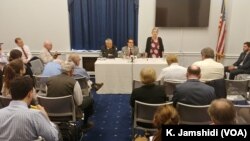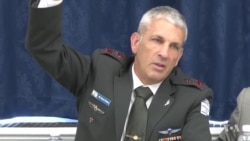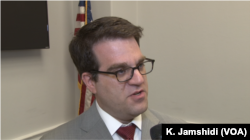An Israeli general says his nation’s recent strikes on Iranian forces in Syria have left Iran far from cementing a presence there but also have left Israel needing support to end that presence completely.
Wednesday’s comments by Israeli Major General Michael Edelstein at a Washington event provided a rare public assessment of Israel’s strategy in Syria from a high-ranking Israeli military officer.
Edelstein, Israel’s defense attaché in Washington, spoke at a Cannon House Office Building panel discussion hosted by the Jewish Policy Center, a conservative-leaning U.S. advocacy group.
Responding to a VOA Persian question, Edelstein said the Israeli campaign against Iranian military activities in Syria, Lebanon and elsewhere is achieving results.
“If I would have to draw a graph, and the Iranians would like to be here in July 2018,” Edelstein said, raising his hand above his head, “they are far away from this [point].”
Israel repeatedly has said it will not allow Iran, its archrival, to establish a permanent military presence in Syria. But Edelstein said Israel has been delaying military action against some Iranian targets there.
“We are not acting against every [Iranian presence in Syria], because we understand the complexity, we understand that it might take us into a war,” he said. “If needed, we will be in such [a conflict]. But up to now, we prefer not be in a war.”
Israel said it carried out sweeping air strikes against Iranian bases in Syria in May, in response to what it said were rockets fired by Iran’s Quds Force toward the Israeli-occupied Golan Heights.
For years, Iran has been sending military personnel to Syria to support President Bashar al-Assad in his civil war with rebels.
But Iran has said little about its military footprint in Syria. Tehran also neither confirmed nor denied responsibility for May’s rocket attack against Israel in the Golan Heights.
Instead, Iranian officials have described their support for Assad and Iranian-allied militant groups as part of an “axis of resistance” against Israel, whose destruction they long have called for.
Edelstein said ending Iran’s military involvement in regional conflicts is something that only superpowers can achieve.
“Definitely, this is something that many, many countries in the region are looking forward to. And these [efforts to counter Iran] can be led only by the U.S.”
U.S. Secretary of State Mike Pompeo, visiting the United Arab Emirates Tuesday, told local newspaper The National that he is working on a “comprehensive program” to diminish Iranian activity in Syria.
The other panelist at Wednesday’s event, Foundation for Defense of Democracies research director David Adesnik, told VOA Persian that U.S. officials are hesitant to expand military operations in the region.
“I think there are many people like Pompeo and National Security Adviser John Bolton who fully understand how important it is to prevent Iran from consolidating a dominant position which it could use to attack U.S. ally Israel and launch terrorist attacks on other targets,” Adesnik said. “Whether the U.S. is willing to keep just a few thousand troops in Syria is a different question. Obviously, President Donald Trump has talked about pulling out. So I think we are going to see a tug of war for a little while longer.”
Speaking in April after ordering U.S. missile strikes on Syria in response to what the U.S. and its allies said was a Syrian government chemical weapon attack near Damascus, Trump said U.S. troops would not have an indefinite presence in the country, where they have been fighting Islamic State militants. Assad denied carrying out a chemical attack.
“As other nations step up their contributions (in the fight against the Islamic State group), we look forward to the day when we can bring our warriors home,” Trump said, without specifying a timetable.
This report was produced in collaboration with VOA’s Persian Service.








